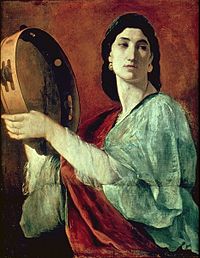
Miriam, the prophetess by Anselm Feuerbach
Gospel Doctrine Old Testament Lesson #13, Exodus 1–3, Exodus 5–6, Exodus 11–13, Exodus 14
Exodus is the birth story of a people.
Planted in the womb of Egypt, the Hebrew people grew and developed in darkness, without a prophet-father-leader (Pharoah “knew not Joseph”), without freedom. The birth pangs began with locusts and frogs and boils and harder taskmasters and blood—and ended when they finally descended into the Red Sea. A miraculous canal opened before them and they made their narrow passage through it, emerging as a free people united in a common covenant.
As a professional who attends women in childbirth, in any typical birth story I would expect to hear something about the women who presided at the birth: the mother, the midwife, the doula, the sister, the grandmother, the friend, the daughter, the angel ancestor. These provide comfort, guidance, sometimes life-saving support, and perhaps just as importantly, celebration.
In the Exodus birth story, when the Hebrews have finally made safe passage through the Red Sea, a woman does lead them in celebration and praise (the “Song of the Sea”).
And Miriam the prophetess, the sister of Aaron, took a timbrel in her hand; and all the women went out after her with timbrels and with dances. And Miriam answered them, Sing ye to the Lord, for he hath triumphed gloriously; the horse and his rider hath he thrown into the sea.[1]
(Miriam the prophetess. Say it in your lesson. No distinctly prophetic activity is attributed to Miriam in the Bible, unlike Deborah or Huldah, [2] so either the prophetess designation is anachronistic, or there is something distinctive about Miriam’s prophecy, or we have lost important parts of her story. But the words are there right in our Bible—Miryam ha-neviyah—and so we have every excuse to say them. Miriam the prophetess.)
In Egypt, the children of Israel had no prophets, but they had midwives. Two of the bravest women in the Bible show up in this lesson’s verses: Shifrah and Puah, the midwives who defied Pharoah’s order to kill all newborn Hebrew boys. They faced him in person, and made their excuses, at risk of their lives. They were set free to continue their work leading the “Midwives’ Rebellion,” delivering a fresh generation of Hebrew children who would see the promised land, heralding the delivery of their entire people.[3]
Without these women leaders, there would have been no Moses. Interestingly, at least one Jewish tradition portrays Miriam as a midwife by trade.[4] Without Miriam, there also would have been no Moses: she is traditionally believed to be the older sister who delivered him to safety in Pharoah’s house and secured his mother to be his nursemaid. These were truly the midwives of a people.
We can derive from the Bible some idea of Miriam’s importance as a leader to the nascent people of Israel. The prophet Micah calls upon that people to remember God:
For I brought thee up out of the land of Egypt, and redeemed thee out of the house of servants; and I sent before thee Moses, Aaron, and Miriam.[5]
God sent her. He sent her before (in front of, preparing the way, leading) His people. According to this verse, at least, Miriam is described in no less important tones than Moses and Aaron—three shepherds to Israel.
Miriam’s “Song of the Sea” sets a model for us as women and as a church. We are called to rejoicing, celebration, music-making, psalm-singing, as we are delivered—daily, or generation by generation—from bondage, birth, falsehood, fear, darkness, and eventually death. We as women are integral to that deliverance, whether as mothers or as figurative midwives. We give birth to deliverers. We catch them in our hands. We carry them to safety. We nurse them and raise them. We lead them across the sea. They are our sons and our daughters.
[1] Exodus 15:20-21.
[2] Burns, Rita. “Miriam,” Anchor Bible Dictionary. New York: Doubleday, 1992. IV p. 870.
[3] Exodus 1:15-22.
[4] Talmud, Sotah 11b and 12b.
[5] Micah 6:4.
